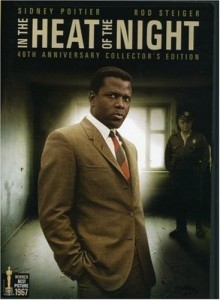 The latest stop on my quest to see every single Best Picture winner in history: 1967’s In the Heat of the Night starring Sidney Poitier and Rod Steiger.
The latest stop on my quest to see every single Best Picture winner in history: 1967’s In the Heat of the Night starring Sidney Poitier and Rod Steiger.
It’s the story of Virgil Tibbs (Poitier), a homicide detective from Philadelphia who is accidentally picked up as a murder suspect in the small-town community of Sparta, Mississippi. With a murderer on the loose, the racist cops in charge pick up Tibbs as a suspect simply because of the color of his skin. They treat him like shit only to find out that he’s actually a super-awesome homicide expert and then they proceed to beg him for his help later. Why? Because they’re all moronic racist southerners who can’t do their jobs.
With compelling performances by both Poitier and Steiger (who won the Best Actor statue), In the Heat of the Night was a nicely paced and intriguing film to watch. My modern-day film expectations always wrongly affect my judgement and predictions. I find myself over-complicating storylines in my head when really, it’s just a friggin’ 60’s movie. I couldn’t have guessed the ending because I had already fabricated some overly dramatic and ridiculous finish in my head. Samsonite. I was way off!
The racism in the movie really pissed me off. I can’t imagine what it must have been like to live in America with such blatant prejudice and racism abound. I often found Steiger’s character Bill Gillespie to be repulsive, as well as his entire crew of cronies. When the end of the film hits, Gillespie comes around and finds himself respecting Tibbs, but I didn’t really feel like the characterization throughout the film had actually gotten us to that point. Although racism still remains to be a plague on our society, the openness of the bigotry in the film was really a turn off, but eventually led to a very insightful movie that (sadly) captured the zeitgeist of the South in the 60’s (Thank God the North won, am I right!? I’m kidding! Kind of.). I may not be old enough to remember the 60’s, but frankly, I’m glad. Sometimes I’m ashamed to think that that’s how society actually was. And it’s revolting.
Many of Poitier’s movies all concerned racial relations. Guess Who’s Coming to Dinner comes to mind, as does To Sir, With Love. On one hand, it’s a shame that Poitier had to even play roles like that – ones that oftentimes singled him out and highlighted his race in order to serve a story or make a point. But on the other hand, maybe Poitier was able to serve as a fine example to society. Maybe he was able to change some cold-hearted, prejudiced opinions for the better. Who knows. Either way, he’s an amazing actor.
Oscar Fun Fact: Poitier was the first black man to win an Academy Award for Best Actor for 1963’s Lilies of the Field. Kudos. Save that one for your next round of Trivial Pursuit.
Man, Oscar movies. If not death and suicides and Nazi’s, it’s racism. Rough stuff, homies. Real rough.



dude you fucking complain too much, shut up and enjoy the movie, other words, you script the thing, direct it, and act in it. ffs.
America has always been racist,look who we have for a president, racist,sexist, Jew hating Nazi, America, never great, never will be
Thanks for reading! Come again soon, friend!!
You have a fan!!!
I probably won’t ever watch this movie, but I enjoyed the review. And the Oscar Fun Fact. I’m sticking that in my pocket for later.